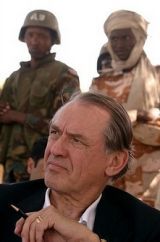UN envoy says Darfur nearing ‘moment of truth’
July 8, 2007 (KHARTOUM) — The special United Nations envoy to Sudan Jan Eliasson said on Sunday that the “moment of truth” for the country’s war-torn western region of Darfur is imminent.

“We are now on a daily contact with the movements and we hope that, by the (July 15) meeting in Tripoli… we will start what we call the pre-negotiation period” of shuttle diplomacy, the former Swedish foreign minister said.
The Tripoli meeting on Darfur, to which 13 countries have been invited, will mark the end of the “convergence” phase for initiatives put forward by various countries including Libya, Eritrea and Egypt to end the crisis.
In August, a shuttle process is planned between the various parties to bring the many rebel groups which have not yet signed up to a 2006 peace agreement to the table, Eliasson added.
“Then (UN) Secretary General Ban Ki-moon, who is deeply engaged in this matter, and AU Chairman Alpha Oumar Konare will decide if the moment is right for issuing invitations to negotiations.
“That’s the moment of truth for the parties to the conflict to see whether they are really ready to discuss peace in Darfur and not to continue the conflict,” he said.
The search for a peaceful solution to the conflict that erupted in 2003 has been complicated by the splintering of those rebel movements opposed to last year’s Abuja peace accord which was signed only by the Sudanese Liberation Movement (SLM) of Minni Minawi.
Eliasson, however, maintained that he and his fellow negotiators are in contact with most of the rebel movements, as well as with the Sudanese government which he said had confirmed to him the impossibility of a military solution after more than four years of what Washington has called “genocide.”
The Tripoli meeting involving 11 regional countries, the United States and the European Union will be a key step in the international organisations’ efforts to solve the festering crisis.
Eliasson emphasised that the international community “is tired of paying for something which I can compare to an infected wound,” which costs 700 million dollars in humanitarian aid annually.
He said that money could be better used for development projects to “make life better for the people of Darfur.”
According to UN estimates, more than 200,000 people have died in Darfur over the past four years and some two million have been displaced.
Eliasson’s efforts have been bolstered by Saturday’s arrival of his AU counterpart who will continue talks with officials, and who he said has an identical vision for peace in Darfur.
“There’s not a shade of difference between us,” he said.
Now the veteran diplomat’s message to those involved in the peace process is to get serious and prepare for real progress in the long-running crisis.
“Get ready for negotiations, prepare for negotiations and to all others… try now to coordinate all initiatives,” Eliasson added.
(AFP)
